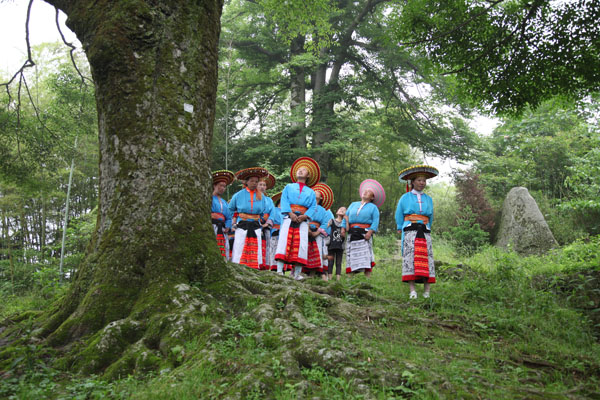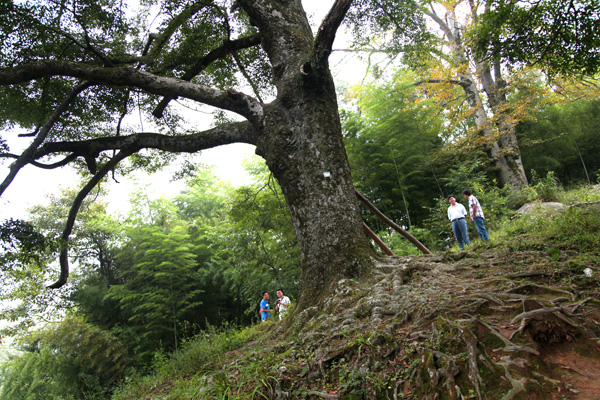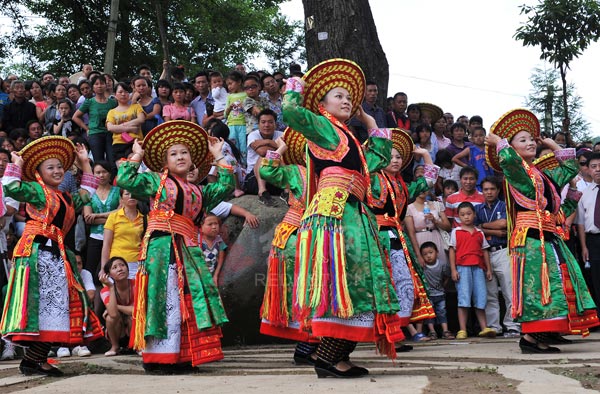A Trip To Chongmudang
Source:Shaoyang International CultureWriter:Liu RyuijunTime:2014-07-06Clicks:次
In the depth of turmoil in history, a tribe were chased and slaughtered by swords. With no time to cry over their homeland treaded by iron feet, they fled to higher mountains with their children. When the war fire that burnt their souls had slowly died out and bloody swords had been placed into sheaths, survivors gathered gradually and, to their surprise, found a peaceful land with the sky and the earth in harmony and grass and woods in abundance and prosperity as if it were arranged by Creator for the suffering creatures. Ever since on top of the high mountains lived a mysterious tribe with a gurgling language, colorful tight skirts, herb medicine merged with sorcery and fantastic customs. Their legends were passed on from one generation to another on summer nights in the breeze by cattail fans and on winter nights by fireplaces. Stereotyped historical memories became some ceremonies not to be told to outsiders, which in turn developed into customs. With their perseverance obtained by birth and their hoes as perseverant, the tribe dug out a land for their survival,where, separated from outside world, they lived generation after generation based on their ancestors’ principles.
The tribe is now called Huayao Nationality, whose manor is Chongmudang on the Tiger-shaped Mountain.

2000 years later, the beautiful figures of Huayao women, like a strong bright beam, attract numerous eyes. Streaming visitors attempt to discover their glory and spiritual nucleon out of their cross-stitch works. Heavily-veiled Chongmudang is revealed, regarded, stared at and reviewed. Many a man walks slowly to honeysuckle, ancient trees, old houses and peach blooms. These heavily-suffering people come there to clean their dusty hearts using the freshness and quietness just as frustrated scholars in Chinese history always chose hills and fields to treat their wounds. In the cold high area people perhaps cannot find fragrant panted carriages but certainly will find their true selves.
Even in burning hot July, the moment you enter Chongmudang, you will feel the sun less hot and your skin cool with the mountain breeze blowing. Looking afar, you will find a kind of wildness and grandness in the ranging mountains and a kind of profoundness in the wildness and grandness. No matter how the world changes with one staging after another’s exit, here it is a sole universe and a homeland, simple but abundant, and unconventional but of true life. Cooking smoke rises from chimneys circling over roofs to form remembering complexes. Songs loudly sung by Huayao men go against modern prosperity outside the mountains.

The lonely village, as if it escaped on purpose from the dusty world, is as old as a grandmother, with wooden houses of old structure, black tiles and suspended supporting carved columns, all of which are covered with layer after layer of dust of years. Even if they are newly painted they will still send out historical smells of tranquility, sadness or fright which permeated the wood. The houses reflect the nature of the nationality: that is, peaceful beauty like an autumn leaf against heavy rain and strong wind. Behind houses, there are stables for cows and pigs and in front of them baskets, hoes, bamboo hats, coir raincoats and other everyday farming tools, which are necessary images of countryside culture, making a mixture of life and beauty, natural and never artificial. Under eaves there sit relic-like elders in their national clothes, looking quietly at the fields of green vegetables as though they could see everything through with their quietness and no wind and rain could frighten them. Sometimes bright cross-stick Huayao skirts can be seen hung on fences or withered tree branches, which look like bright peach blooms, adding to primitively simple and inward-going village an amorous attraction that causes an endless imagination.
During the season of honeysuckle in bloom, flower fragrance flows everywhere here. Silver-white or gold-yellow honeysuckle spreads on hill slopes, winding and weaving its vines to form a graceful and circuitous poem that sends out fragrance. Scholars of Chinese type always tend to place their emotions on flowers and trees. For example, Lin Hejing regarded the plum bloom as his wife, Zhou Dunyi “only loved the lotus flower for its spotlessness out of sludge” and Tao Qian “picked chrysanthemum flowers by the eastern fence”. But why few people are willing to convey their true feelings to honeysuckle? Fortunately, though no praise of it is found in poetry by men of letters, yet it remains so beautiful and graceful with its fragrance and nobility as to leave its watchers dumfounded. It is the embodiment of Chongmudang people’s feeling. It grows solely in silent high mountains, enjoying its own magnificence happily by itself and experiencing the process of life absorbedly regardless of what remarks there are from outside. It is a support of Chongmudang people’s living, for it wins bread and houses for them. People are busy with honeysuckle in drying houses where it revives after death. The revived honeysuckle then goes to a broad world from here. Meanwhile Yangtao fruit awaits autumn’s arrival quietly. When it turns its color, it draws people’s admiration.

What matches the graceful beauty of honeysuckle is the great splendidness of ancient high trees. “Ancient trees scraping the sky” is the truth here. There stands a forbidding stone tablet set during the Qing Dynasty for the purpose to protect woods, from which one can see how much of the times the woods have witnessed. There are kinds of trees such as oak trees and chestnut trees, the youngest of which have stood for over 100 years. The roots of Asiatic beech are like stretched fingers grasping the top soil of land and supporting itself. Each tree once stood against the whirlwind and the storm but yet remains graceful and charming, with branches connecting, leaves covering each other and fish scale-like rough tree bark reflecting grinding years that you cannot see through. But from them you can hear everlasting singing of Huayao people. They are antiphonic love songs. Huayao people have no language of their own, so Confucius had no chance to criticize them. However, their wildness and frankness are even closer to humanity and nature. Chongmudang people pour humanist spirit and holy belief into trees. Because of this simple adoration, the ancient trees survived under Chongmudang people’s protection with tolerance, blood and life even during the period of so-called “Big Leap Forward” when every old tree suffered extinction. In a leisure season without much farming work, Huayao women will sit under an ancient tree doing cross-stitch or sewing work calmly to embroider their dream life, without caring about any worrying things.
Either life or landscape is connected with water. Springs, whether running gurglingly or flowing silently out through rocks, meet and gradually become clear streams, which, with their lovely posture, pure bright color and sweet taste, is suitable for cleaning tassels, washing feet, drinking or feeding livestocks. In Taoist culture water is said to be kind. “The greatest kindness is that of water.” In Yuefu poetry, water is seen as a feeling. “lovers on either bank of a stream, staring speechlessly with deep feelings.” When on the summit of a mountain, flowing water is an expression of Chongmudang women’s nature. Water is also a necessity and a decorate of life. If we say that mountains make life rich and colorful, then water makes life bright, pure and clear.
Here the sky is clean, the sun is clean and any of soil, crops and air is also clean. Everything has a kind of cleanness that one can only realize. Bathed in sunshine, Chongmudang Village feels like a quiet woman coming out of dust. On a moon-lit night, the village is like a heavenly land or a dream land combined with reality as everything in it looks bright under the clear sky. Every object, whether the bright moon, or the twinkling stars, or honeysuckle or an old tree, is an inspiration to a man of letters.
It is said that the village is listed as a China’s traditional village. The villagers did not expect their village penetrated with their forefathers’ blood to bear so remarkable a flower after centuries of sufferings. In a passer-by’s eyes, Chongmudang is just a relic, but in Chongmudang people’s view, they have entered an new era.。

(translated by Yi Daoqun)
The tribe is now called Huayao Nationality, whose manor is Chongmudang on the Tiger-shaped Mountain.

2000 years later, the beautiful figures of Huayao women, like a strong bright beam, attract numerous eyes. Streaming visitors attempt to discover their glory and spiritual nucleon out of their cross-stitch works. Heavily-veiled Chongmudang is revealed, regarded, stared at and reviewed. Many a man walks slowly to honeysuckle, ancient trees, old houses and peach blooms. These heavily-suffering people come there to clean their dusty hearts using the freshness and quietness just as frustrated scholars in Chinese history always chose hills and fields to treat their wounds. In the cold high area people perhaps cannot find fragrant panted carriages but certainly will find their true selves.
Even in burning hot July, the moment you enter Chongmudang, you will feel the sun less hot and your skin cool with the mountain breeze blowing. Looking afar, you will find a kind of wildness and grandness in the ranging mountains and a kind of profoundness in the wildness and grandness. No matter how the world changes with one staging after another’s exit, here it is a sole universe and a homeland, simple but abundant, and unconventional but of true life. Cooking smoke rises from chimneys circling over roofs to form remembering complexes. Songs loudly sung by Huayao men go against modern prosperity outside the mountains.

The lonely village, as if it escaped on purpose from the dusty world, is as old as a grandmother, with wooden houses of old structure, black tiles and suspended supporting carved columns, all of which are covered with layer after layer of dust of years. Even if they are newly painted they will still send out historical smells of tranquility, sadness or fright which permeated the wood. The houses reflect the nature of the nationality: that is, peaceful beauty like an autumn leaf against heavy rain and strong wind. Behind houses, there are stables for cows and pigs and in front of them baskets, hoes, bamboo hats, coir raincoats and other everyday farming tools, which are necessary images of countryside culture, making a mixture of life and beauty, natural and never artificial. Under eaves there sit relic-like elders in their national clothes, looking quietly at the fields of green vegetables as though they could see everything through with their quietness and no wind and rain could frighten them. Sometimes bright cross-stick Huayao skirts can be seen hung on fences or withered tree branches, which look like bright peach blooms, adding to primitively simple and inward-going village an amorous attraction that causes an endless imagination.
During the season of honeysuckle in bloom, flower fragrance flows everywhere here. Silver-white or gold-yellow honeysuckle spreads on hill slopes, winding and weaving its vines to form a graceful and circuitous poem that sends out fragrance. Scholars of Chinese type always tend to place their emotions on flowers and trees. For example, Lin Hejing regarded the plum bloom as his wife, Zhou Dunyi “only loved the lotus flower for its spotlessness out of sludge” and Tao Qian “picked chrysanthemum flowers by the eastern fence”. But why few people are willing to convey their true feelings to honeysuckle? Fortunately, though no praise of it is found in poetry by men of letters, yet it remains so beautiful and graceful with its fragrance and nobility as to leave its watchers dumfounded. It is the embodiment of Chongmudang people’s feeling. It grows solely in silent high mountains, enjoying its own magnificence happily by itself and experiencing the process of life absorbedly regardless of what remarks there are from outside. It is a support of Chongmudang people’s living, for it wins bread and houses for them. People are busy with honeysuckle in drying houses where it revives after death. The revived honeysuckle then goes to a broad world from here. Meanwhile Yangtao fruit awaits autumn’s arrival quietly. When it turns its color, it draws people’s admiration.

What matches the graceful beauty of honeysuckle is the great splendidness of ancient high trees. “Ancient trees scraping the sky” is the truth here. There stands a forbidding stone tablet set during the Qing Dynasty for the purpose to protect woods, from which one can see how much of the times the woods have witnessed. There are kinds of trees such as oak trees and chestnut trees, the youngest of which have stood for over 100 years. The roots of Asiatic beech are like stretched fingers grasping the top soil of land and supporting itself. Each tree once stood against the whirlwind and the storm but yet remains graceful and charming, with branches connecting, leaves covering each other and fish scale-like rough tree bark reflecting grinding years that you cannot see through. But from them you can hear everlasting singing of Huayao people. They are antiphonic love songs. Huayao people have no language of their own, so Confucius had no chance to criticize them. However, their wildness and frankness are even closer to humanity and nature. Chongmudang people pour humanist spirit and holy belief into trees. Because of this simple adoration, the ancient trees survived under Chongmudang people’s protection with tolerance, blood and life even during the period of so-called “Big Leap Forward” when every old tree suffered extinction. In a leisure season without much farming work, Huayao women will sit under an ancient tree doing cross-stitch or sewing work calmly to embroider their dream life, without caring about any worrying things.
Either life or landscape is connected with water. Springs, whether running gurglingly or flowing silently out through rocks, meet and gradually become clear streams, which, with their lovely posture, pure bright color and sweet taste, is suitable for cleaning tassels, washing feet, drinking or feeding livestocks. In Taoist culture water is said to be kind. “The greatest kindness is that of water.” In Yuefu poetry, water is seen as a feeling. “lovers on either bank of a stream, staring speechlessly with deep feelings.” When on the summit of a mountain, flowing water is an expression of Chongmudang women’s nature. Water is also a necessity and a decorate of life. If we say that mountains make life rich and colorful, then water makes life bright, pure and clear.
Here the sky is clean, the sun is clean and any of soil, crops and air is also clean. Everything has a kind of cleanness that one can only realize. Bathed in sunshine, Chongmudang Village feels like a quiet woman coming out of dust. On a moon-lit night, the village is like a heavenly land or a dream land combined with reality as everything in it looks bright under the clear sky. Every object, whether the bright moon, or the twinkling stars, or honeysuckle or an old tree, is an inspiration to a man of letters.
It is said that the village is listed as a China’s traditional village. The villagers did not expect their village penetrated with their forefathers’ blood to bear so remarkable a flower after centuries of sufferings. In a passer-by’s eyes, Chongmudang is just a relic, but in Chongmudang people’s view, they have entered an new era.。

(translated by Yi Daoqun)
